Indie Monthly: January 2024
All the indie previews that are fit to print

2024 is likely to be a huge year for indie games. With most of the big AAA prestige titles already out and GTA 6 still on the horizon, the field is wide open for any upstarts trying to make their mark.
The year has already gotten off to an impressive start. The biggest video game news for the last few weeks has been Palworld, which has achieved concurrent player counts higher than Dota and Counter-Strike while also courting controversy and drawing legal attention from the Pokemon Company. But even setting that aside, we've already seen several releases that have sold well into the six-figure range at a time when the AAA big dogs don't seem to be doing much.
Given that this is set to be such a big year, I've decided to forego individual reviews in favor of a monthly round-up. There are just too many games to deal with them all individually - there were purportedly 14,000 games launched in 2023, and 2024 may well break that record. This will let me look at more games as well as smaller and more niche titles that might not otherwise merit an 800-word writeup.
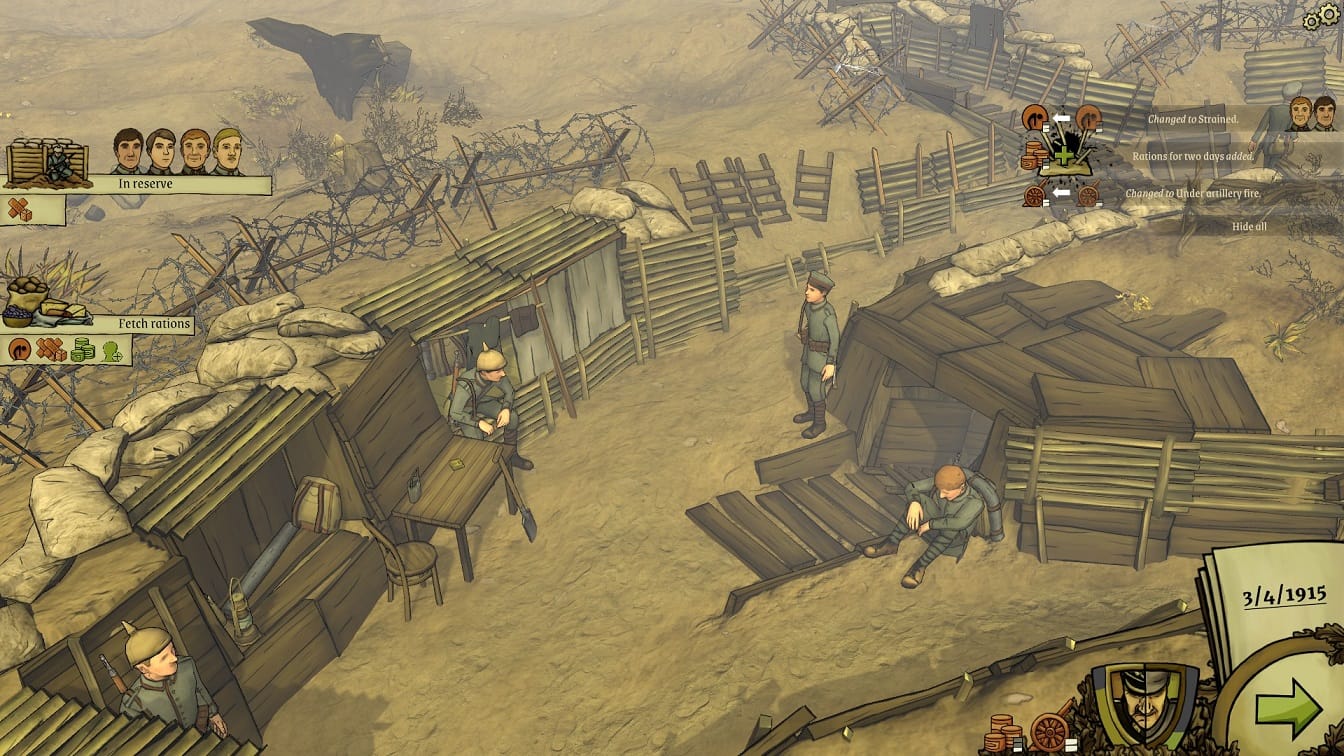
All Quiet in the Trenches
1915, the Western Front of the First World War. You are a newly minted unteroffizier, a low-ranked officer in the Imperial German army in charge of a team of fresh recruits. Your charge is a simple one: Do what your lieutenant says, no matter what. Combat is never that simple, though, and your real job will be to balance the needs of the army with those of your men and hopefully get out alive.
All Quiet in the Trenches is, at heart, a management game. Between battles, the player's goal is to complete various tasks around the camp by assigning soldiers to those jobs. When the shooting starts, the player is tasked with a specific mission and must order the soldiers around to complete all tasks, ideally without getting anyone killed. Unexpected events can also occur on different days, and the player's choices during those events (as well as their willingness or refusal to complete more mundane tasks) can have a long-term impact.
The real objective is not winning the war - this is not a game of glory. It's made clear from the start that the player and the player's men are a very petty part of a far larger conflict. You aren't going to win the war, and you probably won't even win the battle - but that's not the point. Your real goal is just to survive and avoid making any enemies on your own side as you pass from day to day.
All Quiet in the Trenches follows in the tradition of games like This War of Mine in that it has an anti-war message, but rather than focusing on the horrors of combat, it is more about the grind of warfare in general. Your men may never be killed by artillery, but that doesn't mean that the constant explosions aren't affecting them. You will never have enough men to do everything you need to do, which means you'll need to decide whom you're willing to upset - your superiors, local civilians, support staff, even your own men. Everything you do has a price, and you'll need to live with the consequences.
All Quiet in the Trenches is available for PC via Steam. A copy was provided for this review.
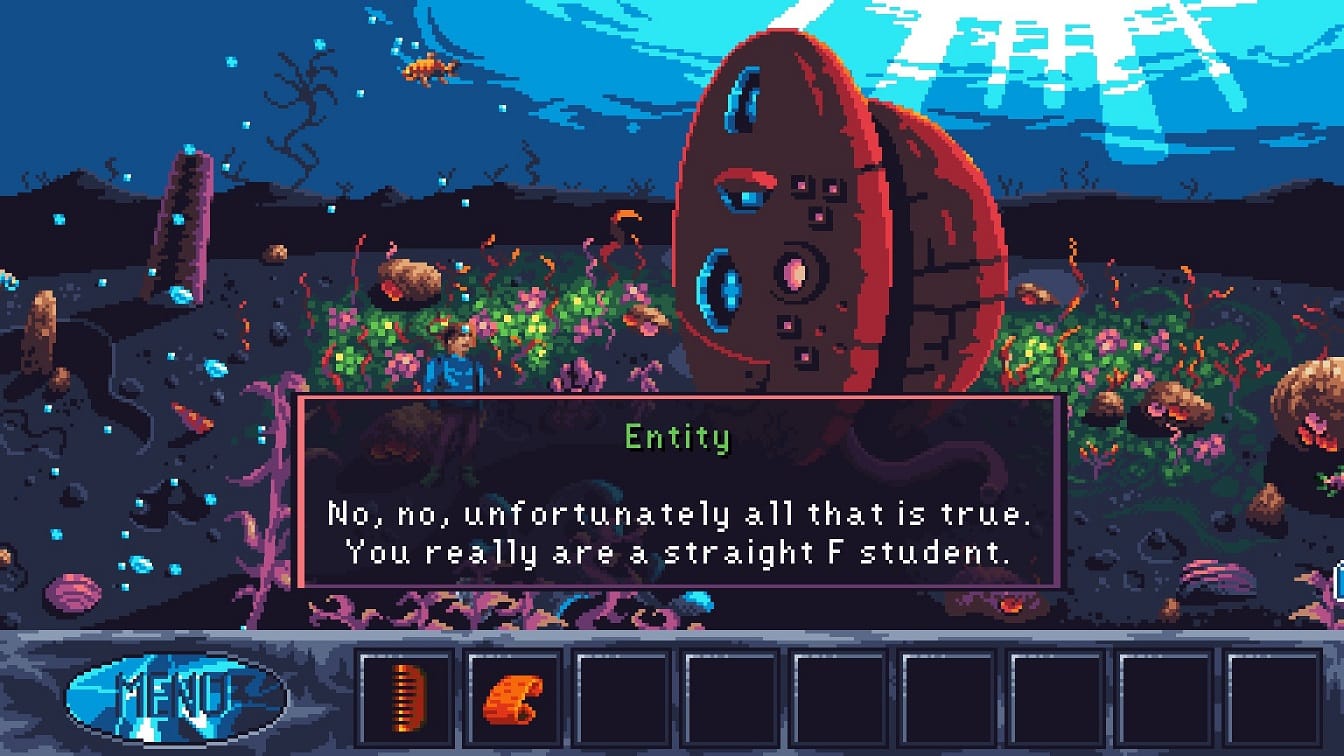
Twilight Oracle
Leo is a gifted failure. A student with the magical talent to breathe underwater, he is on the verge of getting expelled from his school and banished to parts unknown. He has one last desperate chance to keep his life on track - lead a group of other gifted losers to a distant world and bring back a renegade student. But when it turns out that this renegade isn't exactly what Leo expected, he finds himself drawn into a quest to unveil the secrets of his school headmasters.
Twilight Oracle is a love letter to PC adventure games of the 90s, with mechanics to match. Leo collects various objects which he then uses to solve puzzles, aided with an occasional assist from one of his peers or another NPC. All of this is standard for games of that era, so don't expect to encounter a lot of unusual mechanics. The game is divided into chapters, each with a set of distinct objectives.
Looking at the screenshots, you'll probably notice some obvious inspiration: Twilight Oracle is aesthetically inspired by LucasArts games. In particular, the art, animations, dialogue and puzzle design draw a lot of influence from the first few Monkey Island titles. Leo has a little Guybrush Threepwood in him, being incompetent yet charming with a snarky comment for everything he sees. The humor is definitely one of the draws here, and how much you appreciate it will affect your enjoyment of the game.
Overall, Twilight Oracle is meant for people with nostalgia for adventure games of the CD-ROM era. If you have fond memories of games like The Secret of Monkey Island or Indiana Jones and the Fate of Atlantis, then this is right up your alley. If you don't have that kind of passion, then this one probably won't win you over.
Twilight Oracle is available for PC via Steam, Itch.io and FireFlower. A copy was provided for this review.
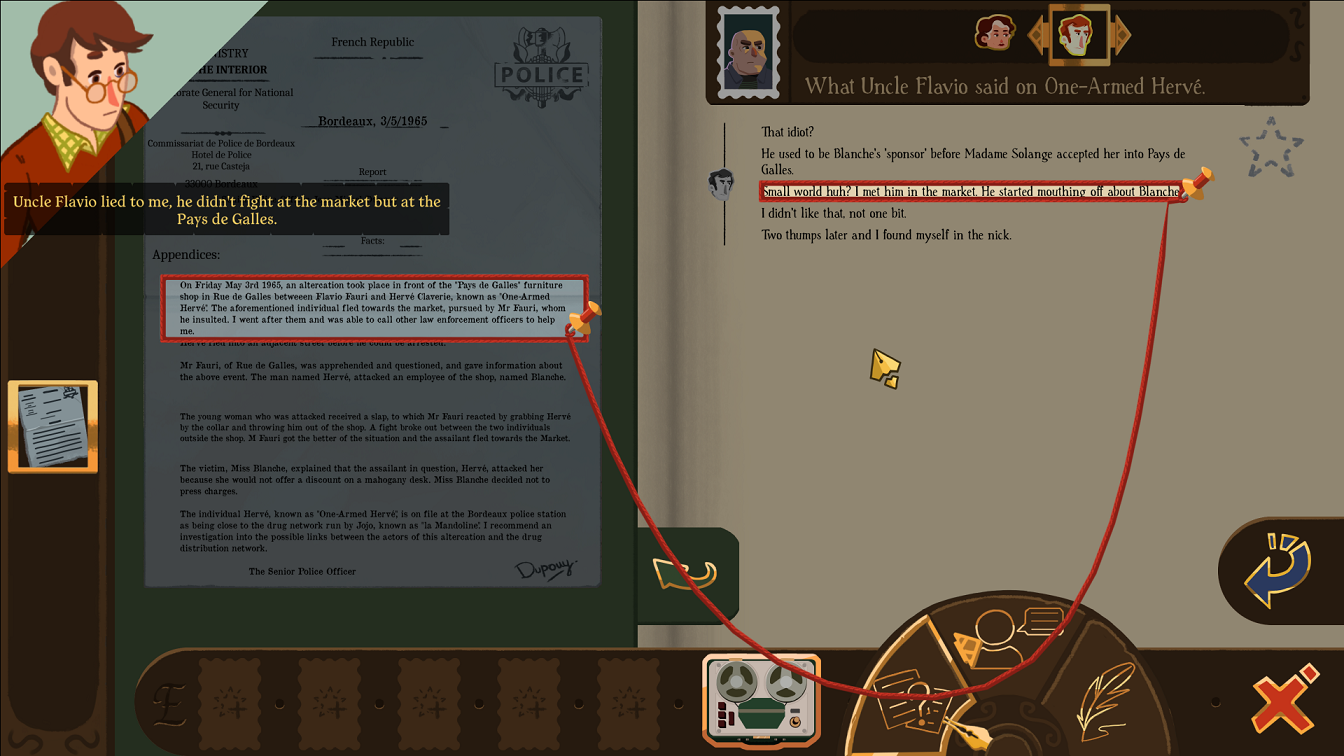
Chronique des Silencieux
Southern France, the 1960s. Eugene, a French-Italian teenager, is on his way to Bordeaux to visit his uncle Flavio, a man he believes works in an antique shop. On arrival, he has several rude revelations - Flavio is really a guard for a brothel, he is currently locked up for a fight, and the other man in that altercation has just turned up dead. But that's just the beginning of the mystery. It is the south of France during the height of the French Connection, everyone has secrets, and silence is a way of life.
Chronique des Silencieux (Chronicle of Silence) is a detective-themed adventure game. Eugene, a natural-born detective, finds himself drafted into investigations of different figures around Bordeaux. Eugene carries a tape recorder which he uses to record conversations, and the goal is to comb through those discussions in hopes of finding information between the lines.
There are several stages to each investigation. After speaking with a person of interest, Eugene can compare what they said to physical evidence to reveal contradictions. Having done that, he then must deduce the motives and drives of the people involved to make an accusation. Each step has a minigame attached to it which makes the process interesting, though the sheer quantity of information can make it frustrating as well.
One of the more distinctive features of Chronique des Silencieux is its art style. Most of the game features a colorful (if somewhat flat) presentation, but this is broken up with fully animated cutscenes that offer a nice change of pace. Combined with the personalities that Eugene must contend with, it does a good job of capturing the feel of that time and place.
Overall, the game will appeal more to fans of the burgeoning detective game subgenre than to fans of conventional adventure games.
Chronique des Silencieux is available for PC via Steam. A copy was provided for this review.
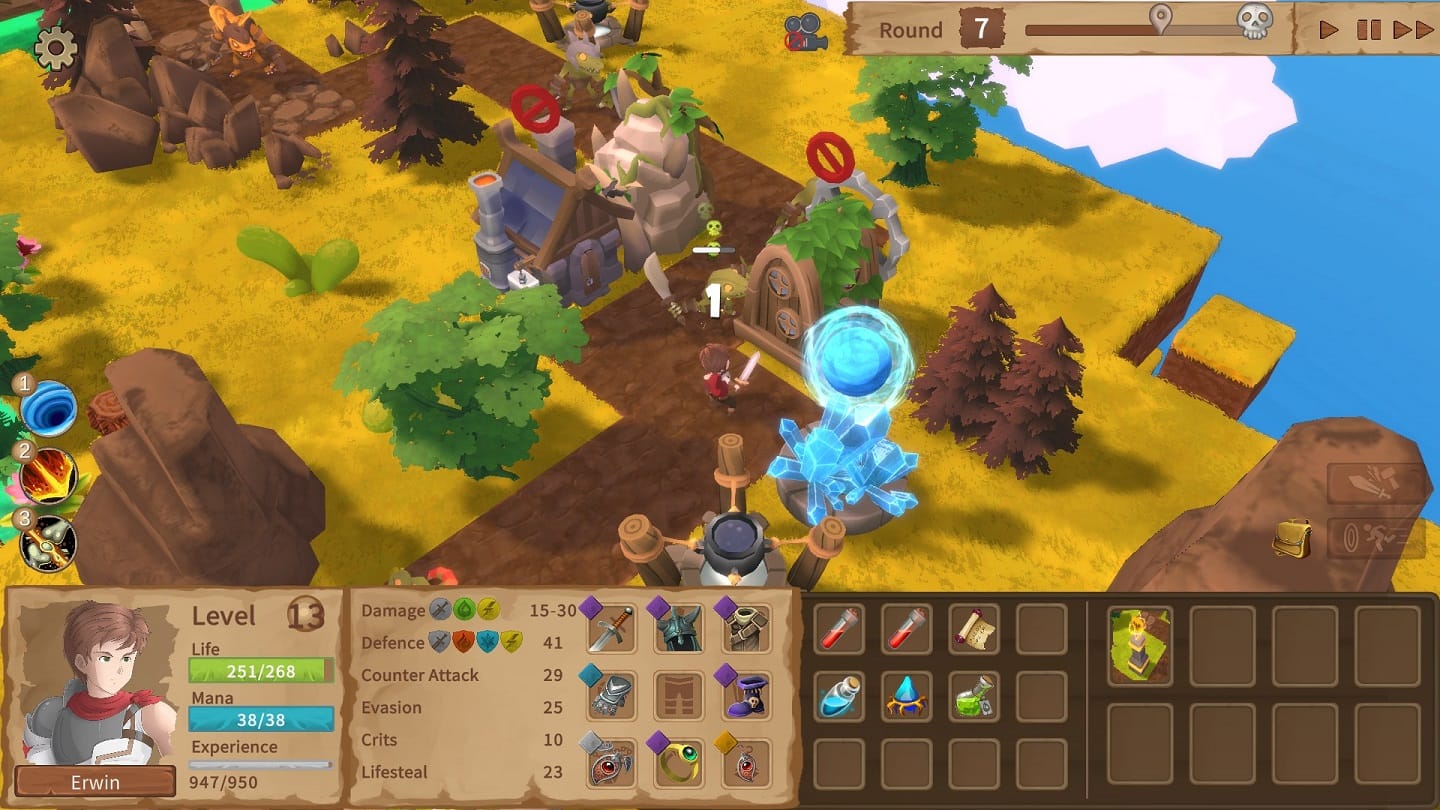
Heroes of Eternal Quest
The world has been reshaped by a strange catastrophe, with the land split into fragments and formed into a vertical structure known as the "Tower of Shards." The only way to pass between the fragments is through a series of portals, but only a select few - the Marked - are capable of using them. Taking on the role of a Marked human, the player must ascend the Tower of Shards, fighting off the Marked of other species that have been trapped into an all-or-nothing struggle with each other.
Heroes of Eternal Quest has definite Loop Hero vibes, but with some tower defense elements in the mix. The player's Marked avatar walks through a closed loop, fighting monsters and growing in power. The objective is to clear a certain number of loops and then defeat a boss, which unlocks the path to the next shard. Defeating enemies unlocks standard RPG gear as well as buildings that offer various benefits - attacking monsters, healing the player, generating items or even spawning weak monsters to provide experience.
Between runs, the player can use resources acquired through gameplay to upgrade their base of operations. These new structures provide permanent bonuses and unlock cards that let the player construct new buildings. These bonuses can be very significant, and given that Marked heroes start each run very fragile, powering up between runs is very important.
Heroes of Eternal Quest is not a very difficult game, but as with any game built around randomness, you will have bad runs. There are ways to mitigate risk, but it's also important to know when to cut your losses. The player can end a run after completing a loop, taking part of their earned resources home. It's a safety valve not available in most roguelike games, and I highly recommend taking advantage of it.
At the end of the day, Heroes of Eternal Quest isn't Loop Hero, but if you liked Loop Hero then you might want to give this one a shot.
Heroes of Eternal Quest is available for PC via Steam. A copy was provided for this review.
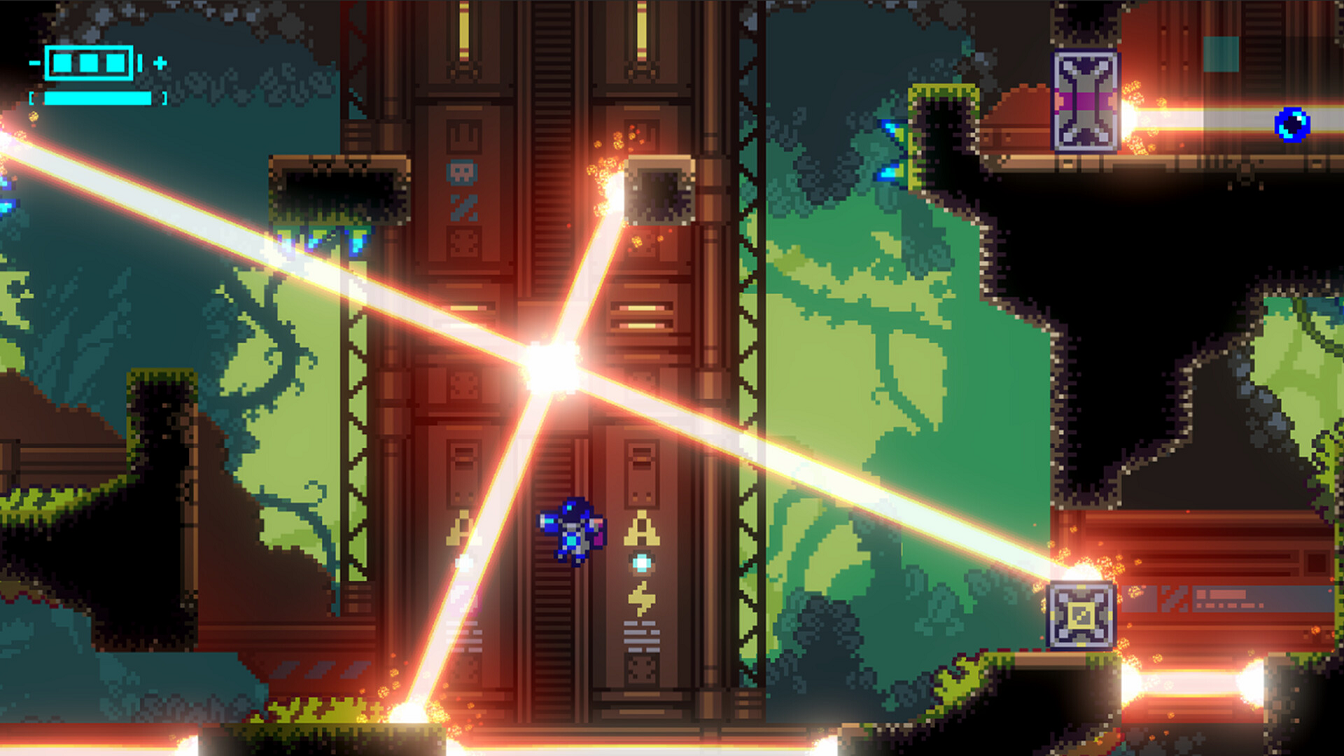
Genopanic (Preview)
You've been dispatched to a literally crumbling laboratory to recover the illegally modified pets that the researchers had been developing. The place is a mess, there are few signs of life, and you will quickly conclude that - shockingly for a sci-fi game - an experiment has gone wrong. It's a pretty standard setup for sci-fi horror, though there are still a few twists here and there.
Genopanic is described as a "Metroidvania-like," presumably because it is a bit more linear than the norm. It still features the expected mechanics - namely, collecting movement powers that can be used to solve puzzles from earlier in the game.
Compared to most games in the subgenre, Genopanic also features fewer enemies and a much heavier focus on technical platforming. As a result, the game is quite a bit harder than most Metroidvanias, with some areas really putting your Meat Boy skills to the test. Fortunately, the controls are tight and responsive and I rarely felt that any of the platforming challenges were unfair.
Navigation can be a little bit trickier. Many surfaces crumble away when the player touches them, and these fragile surfaces often conceal passages that the player needs to take. There are little environmental hints that point to these passages, but finding them is usually a matter of intuition and it might take a while to get a handle on that.
Overall, Genopanic is an interesting-looking title that should appeal to fans of both Metroidvania games and conventional platformers.
Genopanic will be available for PC via Steam. A beta copy was provided for this preview.
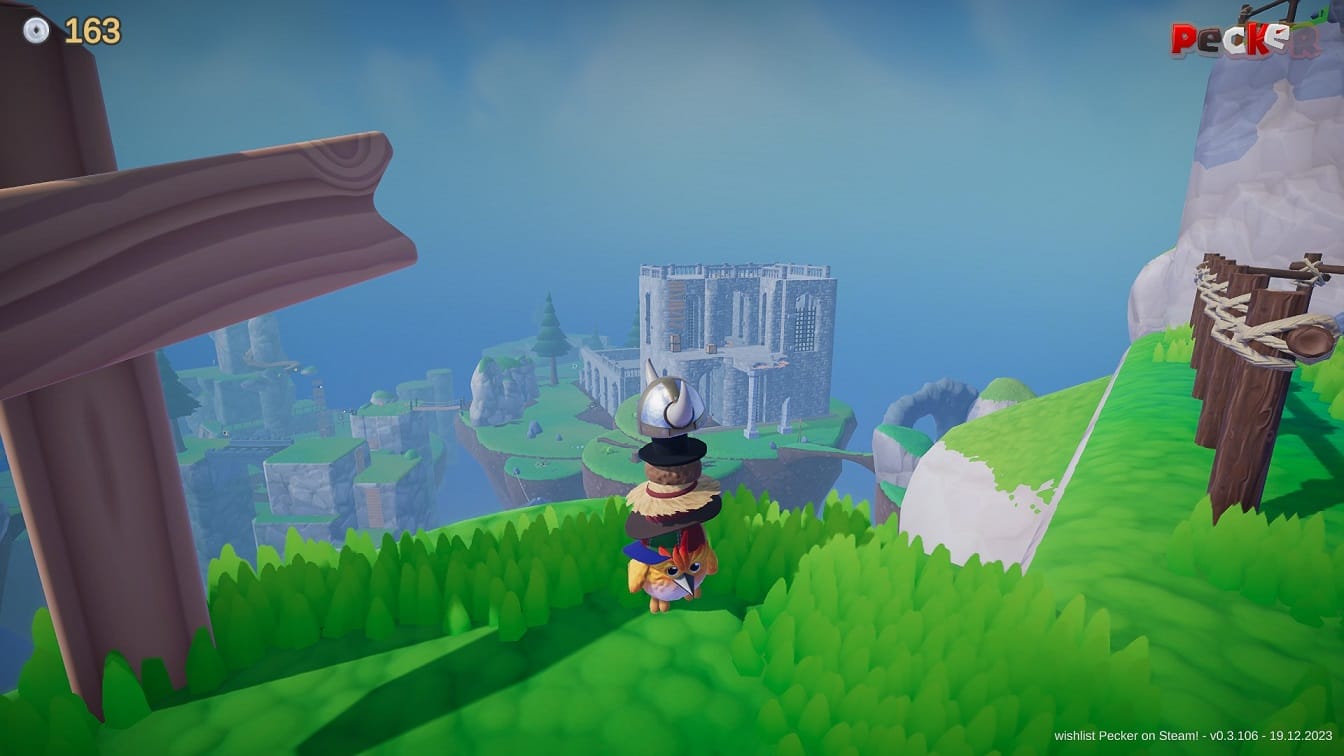
Pecker (Preview)
You are a newly-hatched woodpecker thrust into a world you don't understand. Mere seconds out of the shell, and already you have a quest to journey to a distant realm. Why you have to undertake this journey is a mystery to your fresh bird brain, but then Pecker is a game driven more by gameplay than story.
Pecker is a collectathon-type 3D platformer with a few unique mechanics, most of them centered around the protagonist's long, flexible beak. Your wings are too underdeveloped for flight, but you can still get air by hooking into wooden objects and launching yourself upward. This is the key movement ability, and thankfully it's very intuitive to use.
That beak can be used for a few other tricks. You can use it to rotate objects or even pick locks. It's also useful in combat situations, though enemies in Pecker are relatively rare. This game is focused mostly on the platforming, with very vertical levels to take advantage of the main character's unique form of movement.
While there is a defined path through each level, there is some room for exploration, with little areas that can only be reached through clever manoeuvring. Most of these asides don't offer anything in particular, though you might find a jaunty hat or six to wear.
Overall, Pecker is a casual, easygoing experience meant for an audience looking for something on the more relaxing end.
Pecker will be available for PC via Steam and EGS. A preview copy was provided for this preview.
